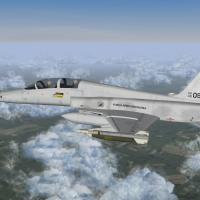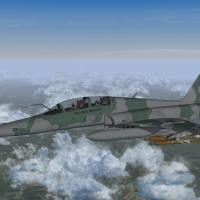About This File
The Northrop F-5A/B Freedom Fighter and the F-5E/F Tiger II are part of a family of supersonic Light fighter, initially designed in the late 1950s by Northrop Corporation. Being smaller and simpler than contemporaries such as the McDonnell Douglas F-4 Phantom II, the F-5 cost less to both procure and operate, making it a popular export aircraft. The F-5 started life as a privately funded light fighter program by Northrop in the 1950s. The design team wrapped a small, highly aerodynamic fighter around two compact and high-thrust General Electric J85 engines, focusing on performance and low cost of maintenance. Though primarily designed for the day air superiority role, the aircraft is also a capable ground-attack platform. The F-5A entered service in the early 1960s. During the Cold War, over 800 were produced through 1972 for U.S. allies. Though the USAF had no acknowledged need for a light fighter, it did procure roughly 1,200 Northrop T-38 Talon trainer aircraft, which were directly based on the F-5A.
After winning the International Fighter Aircraft competition in 1970, a program aimed at providing effective low-cost fighters to American allies, Northrop introduced the second-generation F-5E Tiger II in 1972. This upgrade included more powerful engines, higher fuel capacity, greater wing area and improved leading edge extensions for a better turn rate, optional air-to-air refueling, and improved avionics including air-to-air radar. Primarily used by American allies, it was also used in US training exercises. A total of 1,400 Tiger IIs were built before production ended in 1987. More than 3,800 F-5 and T-38 aircraft were produced in Hawthorne, California.
The F-5 was also developed into a dedicated reconnaissance version, the RF-5 Tigereye. The F-5 also served as a starting point for a series of design studies which resulted in the Northrop YF-17 and the F/A-18 navalized fighter aircraft. The Northrop F-20 Tigershark was an advanced variant to succeed the F-5E which was ultimately canceled when export customers did not emerge. The F-5N/F variants are in service with the United States Navy and United States Marine Corps as an adversary trainer. Approximately 500 aircraft are still in service as of 2014.
In October 1974, the Brazilian Air Force (FAB) ordered 36 F-5E and 6 F-5B aircraft from Northrop for $72 million. The first three aircraft arrived on 12 March 1975. In 1988, FAB acquired 22 F-5E and four F-5EF second-hand USAF "agressor" fighters. A total of 15 of these aircraft were part of the initial batch of 30 aircraft produced by Northrop. In 1990, FAB retired all remaining five F-5Bs; later, they were sent to Brazilian museums around the country.
In 2001, Elbit Systems and Embraer started work on a $230 million Brazilian F-5 modernization program, performed over an eight-year period, upgrading 46 F-5E/F aircraft, re-designated as F-5EM and F-5FM. The modernization centered on several areas: new electronic warfare systems, the Grifo F radar, an air-to-air refueling system, INS/GPS-based navigation, support for new weapons, targeting and self-defense systems, HOTAS, LCD displays, helmet-mounted displays (HMDs), Radar Warning Receiver, encrypted communications, cockpit compatibility for night vision goggles, On-Board Oxygen Generation System (OBOGS) and various new onboard computer upgrades. One important capability is the secure communication with R-99 airborne early warning platforms and ground stations.
Externally, the new aircraft features a larger nose cone that accommodates the larger radar equipment. The first F-5EM was handed over on 21 September 2005. On 7 July 2003, four Rafael Litening III targeting pods were ordered at a cost of USD 13 million, to be used on F-5M together with three Rafael Sky Shield jamming pods ordered in 5 July 2006 at a cost of USD 42 million.
In 2009, FAB bought eight single-seat and three twin-seat F-5F used aircraft from Jordan in a US$21 million deal. These aircraft were built between 1975 and 1980. On 14 April 2011, a contract of $153 million was signed with Embraer and Elbit to modernize the additional F-5s bought from Jordan, and to supply one more flight simulator as a continuation of the contract signed in 2000. These F-5s will receive the same configuration as those from the initial 46 F-5s currently completing the upgrade process. The first delivery of this second batch of upgraded jet fighters is scheduled for 2013 with expected use to 2030.
- FastCargo – 3D modelling
- F/A-18A Cockpit-Brain32
- F/A-18A Avionics-Crusader e CrazyhorseB34
- Sophocles for his superb cockpit work. Every switch is a work of art.
- 3D mod - Denis Oliveira
- Decals - Denis Oliveira
- Texture - Denis Oliveira




Recommended Comments
Create an account or sign in to comment
You need to be a member in order to leave a comment
Create an account
Sign up for a new account in our community. It's easy!
Register a new accountSign in
Already have an account? Sign in here.
Sign In Now